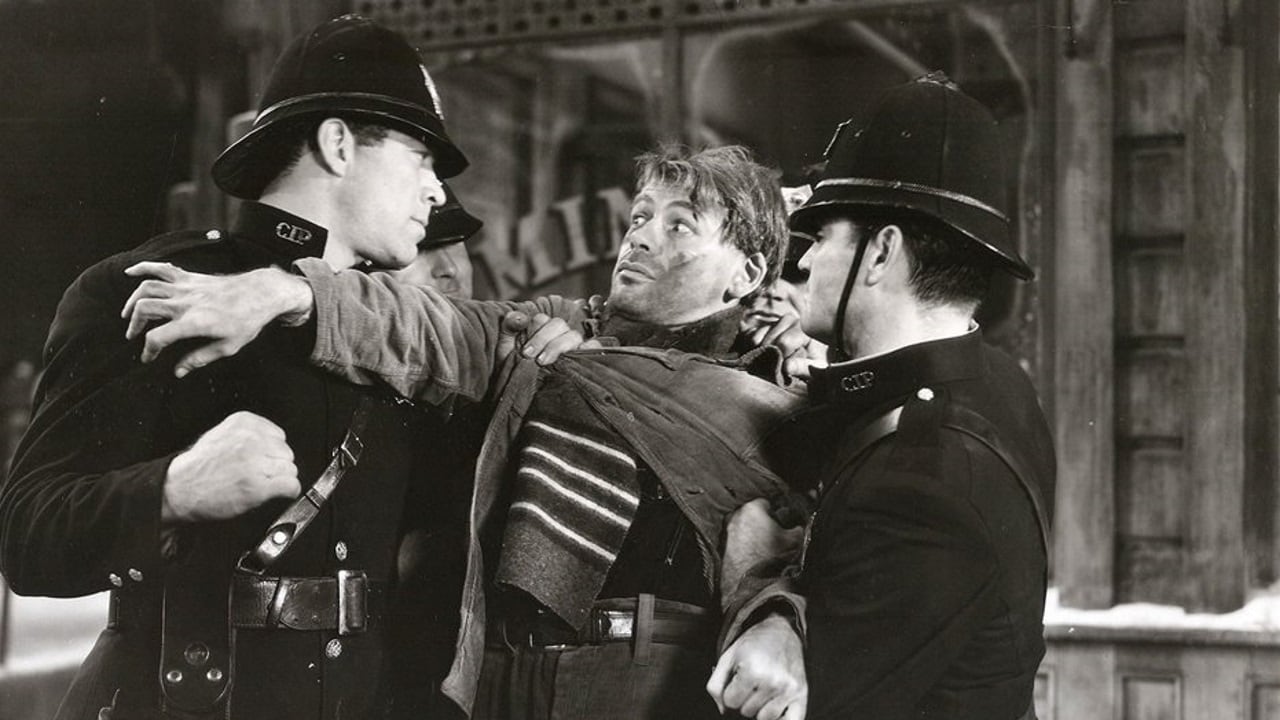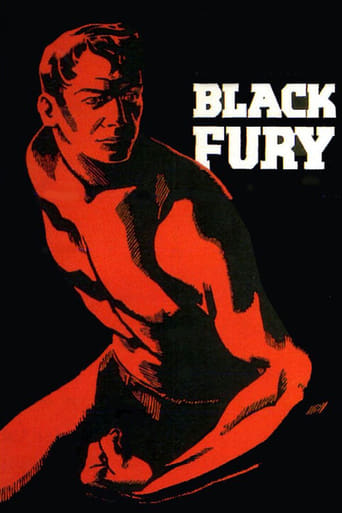

Joe Radek (Paul Muni) is a simple-minded, hardworking immigrant coal miner who dreams of buying a farm and settling down with his girl, Anna (Karen Morley). But when Anna leaves him for another man, Joe falls apart and takes to drinking. In Joe's current state of mind, he's manipulated by a union buster (J. Carrol Naish) into revolting against the mining company. This has disastrous results for the laborers but Joe determines to set things right by any means necessary.Paul Muni's only film with director Michael Curtiz. As was often the case with Muni, his performance can be seen either as brilliant or 100% ham. Whichever it is, I enjoyed it a lot. The cast is full of reliable Warner Bros contract players that are always fun to watch, especially great character actor J. Carrol Naish. It's not surprising this is from WB, the 1930s home of movies about the working class. Certainly interesting from a historical and sociological perspective as a view of labor issues in Depression-era America. It's also fine dramatic entertainment. Based in part on a true story of a 1929 incident at a mine in Imperial Pennsylvania.
... View MoreDynamic social conscience movie from the 1930's studio of record, Warner Bros.-- MGM may have had the glitz, but Warners had the heart. The film is no unmixed triumph. Muni over- acts, at times outrageously, yet most importantly there's no effort at prettifying the lives of the miners. The company shacks the miners must rent are unrelievedly dingy; the streets, narrow and drab; the women, unadorned in cheap house dresses. The only polish or comfort comes from company offices, but that too is understated. The underground sets look authentic-- closed-in, dirty and dangerous. No wonder the company keeps battalions of "cops" on hand. This "company town" is more like a penal colony than a work site, and I'm reminded of the old Tennessee Ernie Ford song "Sixteen Tons". Anyone thinking these conditions exaggerate should Google "Ludlow massacre" or "United Mine Workers of America" for historical insight.The screenplay does a good job of weaving personal stories into the larger social context. At the same time, there are several topical points to note. First, there's a union-management agreement in place at the movie's outset. Neither side is fully happy, but work is proceeding (notice miners aren't paid for work not directly that of extracting coal!). Trouble is that strike-breaking companies like the one Croner (Naish) works for aren't making money during periods of labor calm. So, through Croner, they exploit lingering grievances to break the agreement, and make money. The screenplay casts them as the real villains, and not the union nor the company. Thus, the studio plays it safe by refusing to take sides between labor and management. And if miners are still unhappy, the script suggests conditions will continue to improve with the union behind them. Then too, once the various conflicts ( miners vs. strike-breakers; Radek {Muni}vs. Mc Gee {MacLane}) culminate, a federal government, depicted as justice-seeking, steps in to punish wrong-doers and guarantee the new agreement.Thus, the government in Washington is cast in a non-partisan and positive light. At the same time, union and management are shown as able to reconcile their differences as long as there's no outside agitation. Now, this is in practical alignment with actual New Deal policy towards emergent industrial unions and newly installed federal bargaining rules (National Labor Relations Act). On the other hand, had the script wanted, Croner could have come from the political Left (Communist or socialist) instead of the political Right (strike- breakers). In historical fact, Roosevelt had to confront militant forces from both Left and Right in forging what became a Centrist labor policy that continued for decades. At the same time, the movie reflects much of that approach. Indeed, Warner Bros. was the New Deal's best friend in Hollywood as its many topical films from that period testify. The movie does a good job of motivating the characters. The popular Radek becomes a vulnerable fall-guy for Croner once Anna (Morley) jilts him. Revealingly, both he and Anna are motivated by desires to escape the grueling life of the mines. Farm life may, in turn, be as burdensome, but at least you're your own boss. The very real problem of alcoholism is also hinted at in several scenes, it being the one escape open to the men. Note, however, that the screenplay remains vague on the demands of the break-away union faction, perhaps to keep the audience from taking sides over the strike. Something should also be said about that fine actress Karen Morley, a real-life labor activist in the actor's union. Her angular features bordered on prettiness, but were especially effective in registering icy determination, as a number of 30's films testify (e.g. Our Daily Bread, (1934). Despite its many dated elements, the movie should not be looked at as a dead artifact. True, many of the awful work and living conditions depicted in the movie have since been overcome, thanks to labor's right to organize and bargain. Nonetheless, in our own time, many industrial jobs have been exported to low-wage countries, while coal as an energy source has been de-emphasized. Nonetheless, the basic conflicts between labor and management remain, whether blue-collar or white-collar, while government's role remains key. And in a sagging economy rife with unemployment and stagnant wages, old movies like Black Fury continue to resonate.
... View More"Black Fury" was the second film Paul Muni made after signing a lucrative and very unusual contract with Warner Brothers that essentially allowed him script approval and a great amount of creative control. Muni had been fascinated by the true story of a miner's strike in Philadelphia, and did extensive research, including meeting with a judge who had presided over the case.I've seen all of Muni's films repeatedly and this is unquestionably one of his most accomplished and most unusual roles. For an actor who wast trained on the Yiddish stage and often played old men (even as a juvenile), it's remarkable that during the height of his film career, Muni never played a Jewish character. Joe Radek, a Hungarian immigrant, is probably the closest Muni ever came to playing a character that he "could have been" in real life -- he, too, was an Eastern European immigrant, of working-class stock, and had his parents been laborers instead of itinerant performers, he could easily have wound up like Radek. Radek is a child-like, life-of-the-party type who speaks in broken English, often in the third person ("Everybody love Joe Radek!") For students of acting history, it's the type of performance that you might expect from a "method" actor of a generation later; indeed, those who cite Brando's Stanley Kowalski as "breaking the rules" by speaking with a mouth full of food in a realistic fashion would do well to note Muni's performance here, as his speech is sometimes imprecise and in an early scene he breaks up a fight and makes a speech while gnawing his lunch.The script is fairly decent -- although politically problematic, as it seems to go a bit far to get Joe elected as president of the new union, and presents unions as ineffective or corrupt (and management as greedy and uncaring, of course). At the time of its release, the film was well-reviewed, but the "controversy" over unionization meant that it was censored or banned in some areas, so it was not a box-office success. Still, Muni's performance was powerful enough that he received a "write-in" nomination for Best Actor -- a practice that has since been discontinued by the Oscars (Muni and Bette Davis, for "Of Human Bondage," were the only actors to receive write-in nominations).It's also worth seeing for the excellent, uncompromising direction of Michael Curtiz; supporting performances (and they are ALL supporting in a Muni film -- he is unquestionably the star) are all well-played. Karen Morley is understated as Joe's would-be girl; John Qualen, who has one of the saddest faces in movie history, is excellent as Joe's best friend. The film's ending is a bit hackneyed from today's perspective, but quite effective."Black Fury" is one of about four dozen films from before 1936 that "should" be available on DVD, but isn't, and it's a shame. It is occasionally aired on cable and well worth a look if you are a fan of Muni or socially conscious films of the depression era (in the vein of "I Am a Fugitive From a Chain Gang," "The Grapes of Wrath," etc.)
... View MoreNever realized that Paul Muni, (Joe Radek) played in a film concerning miners in Pennsylvania and gave such an outstanding performance beyond anything I realized he had accomplished in his long career on the silver screen. In this film Joe Radek is an immigrant to this country, however, he is very clever in many ways and seeks justice for his fellow workers in the coal mine in which the town people work. Karen Morley,(Anna Novak) gives a great supporting role to this film and really loves Joe Radek and what he is trying to accomplish. The town is controlled by the coal mine owners and Barton MacLane,( McGree )along with William Gargan,(Slim Johnson/Company Police bully the people in the town along with J Carrol Nash,(Steve Croner) who all work against the miners and control their living conditions. There is a big problem trying to establish a Labor Union and there is a constant battle between the very poor and rich people of the community. Paul Muni gave the best performance I have ever seen in this Classic 1935 film, don't miss this picture.
... View More